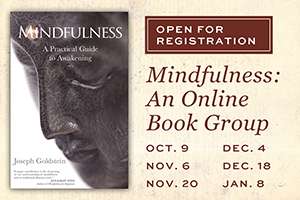
In October, a book study group will be starting, exploring the Four Foundations of Mindfulness and the Satipatthana Sutta, one of the foundational discourses on meditation practice in the Theravada Buddhist tradition. The resource book we will be using is Joseph Goldstein’s Mindfulness: A Practical Guide to Awakening. In this essay, we will explore the four foundations of mindfulness and its implications for insight meditation practice, and liberation from suffering.
First, I would like to share the impression that Joseph’s book describes in precise detail the practices of insight meditation as the Buddha shared them in the Satipatthana Sutta.
The precision and detail of his writing on this topic is truly impressive, and is in my opinion one of the most complete sources on practicing insight meditation, at times expounding on details that many other sources on the Satipatthana Sutta do not clearly cover.
In the words of a Chinese Zen poem, Joseph’s writing style leaves “nothing missing and nothing in excess.”
A working definition of the Four Foundations of Mindfulness might be that they are four aspects of everyday experience, accessible to all of us. The Buddha recommended that practitioners pay mindful attention to these aspects of experience, which are: a) the body and the breath; b) feeling states, which in this instance means the quality of each sense experience as pleasant, unpleasant, or neutral; c) states of consciousness; and d) mental objects, or the structure of the mind’s experiences, and the means to let go of unskillful mental states and to cultivate skillful ones.
The Buddha taught that these four experiences are ones that if seen deeply, lead to insights into the Three Characteristics of Existence: a) impermanence or anicca, the recognition that all of life is changing, including ourselves at every moment; b) unsatisfactoriness or dukkha, the recognition that no experience, however pleasurable, provides lasting satisfaction; and c) not-self or anatta, the recognition that there is no solid entity in anything we see, including ourselves, which are also subject to change and very limited control.
Insight into these three characteristics, when deeply experienced, leads to a profound sense of freedom, which creates relief from the suffering that stems from greed, hatred, and delusion. That letting go is not a volitional choice, but an opening that happens effortlessly when one sees clearly. This clarity is illustrated by a Pali word for insight meditation, vipassana, which is translated as a special way of seeing. Another aspect of insight is clear seeing into our habitual patterns of greed, aversion, and delusion, which each of us uniquely manifests. Knowing our way around those patterns can create the conditions for finding ways to release those patterns and live in greater harmony with ourselves, others, and life itself.
The practice of insight meditation differs in some respects with another frequently practiced Buddhist meditation, that of concentration practice. These practices differ in the following ways:
a) With concentration practice, one works to maintain ongoing mindful attention to the breath. When the mind wanders, as it does, there will be that moment of recognition when one sees that the mind has wandered; at that point, one immediately brings the attention to the breath. Bringing the attention back to the breath creates the conditions for the arising of concentration, calm, and a tranquil mind. And for a clarity of mind that allows the investigation that is vital to insight meditation.
b) Insight practice differs a bit from concentration practice. With insight meditation practice, when the mind has wandered, rather than immediately ushering the mind back to the breath, one pays mindful attention to the experience to which the mind has wandered. Applying mindfulness could lead to the recognition that the experience is impermanent—arising and dissolving. Or that mindful attention might recognize that there is very limited satisfaction that clinging to that object will yield. Or, mindful attention might discover that the object lacks solid status—in other words it arises on its own, based on causes and conditions, without any choice on the part of the meditator. Each of these results in a letting go of grasping and clinging to things that cannot be clung to.
Another important aspect of insight practice is that we begin to discover in a non-judging but precise way the habits of the conditioned mind. In particular, we discover the unique patterns of greed, aversion, and confusion that create the conditions for suffering.
These two forms of insight that issue from meditation—insight into the three characteristics of each experience, and insight into our habitual patterns—inclines the mind to freedom, because each moment of insight leads to moments of letting go, in which the turbulence of the conditioned mind ceases, leaving the mind in a state of peace, silence, and calm. This in turn creates the conditions for the arising of wisdom, compassion, loving kindness, and freedom. Letting go of our clinging and identification, we live our lives with less reactivity, and with greater alignment with the flow of life.
Joe McCormack has practiced Insight Meditation since 1995. He has been a member of the Show Me Dharma Teachers Council in Columbia Mo since 2002. He will be leading a book study group using Mindfulness: A Practical Guide to Awakening by Joseph Goldstein on select Saturdays October 2021- January 2022.
.